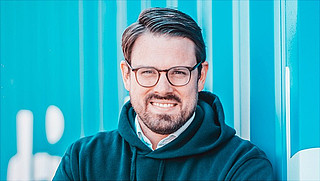Digital Twins and Simulation Modeling in the Context of Seaports
Keynote Mittwoch 9:00-10:30 Uhr
Moderator: Martin Glinz, Universität Zürich
Leonard Heilig, Uni Hamburg, Holger Schütt, aquinet port consulting:
Abstract:
Digitalization is pushing the maritime industry beyond its traditional limits and provides many new opportunities to enhance the productivity, efficiency, and sustainability of logistics. A key element of smart ports is the ability to collect, process, visualize and analyze real-time data while supporting data-driven decision making in highly dynamic environments (Heilig et al., 2017). Against this background, digital twins are considered as key technological enablers of smart ports and Logistics 4.0, by providing a “virtual representation of a physical system (and its associated environment and processes) that is updated through the exchange of information between the physical and virtual systems” (VanDerHorn and Mahadevan, 2021). Given the granular representation of the real environment, simulation modeling and simulation-based optimization can be applied to better analyze different future scenarios and aid decision making in practice.
In this keynote, we first give an overview on digitalization and digital twin applications in seaports. A classification of various applications demonstrates different scopes and functionalities of digital twins. In this context, the project TwinSim, started in October 2021 and funded by the German Federal Ministry for Digital and Transport (BMDV), is presented. TwinSim pursues the development of a digital twin for the visualization and simulation-based optimization of processes at the EUROGATE Container Terminal Hamburg (CTH) in the Port of Hamburg (Germany) based on modern technologies from the areas of Internet of Things (IoT) and big data. This is extended by an on-site visit of the container terminal in the evening.
In the second part, we focus on the development of the digital twin using simulation modeling. Using different examples of container terminals, we show how digital twins form a basis for data-driven decision support on the strategic, tactical, and operational level. This involves the integration of operative systems (such as Terminal Operating Systems) and means of data science (e.g., machine learning) to derive patterns and insights from collected data.
References:
Heilig, L., Lalla-Ruiz, E., & Voß, S. (2017). Digital transformation in maritime ports: analysis and a game theoretic framework. Netnomics: Economic Research and Electronic Networking, 18(2), 227-254.
VanDerHorn, E., & Mahadevan, S. (2021). Digital Twin: Generalization, characterization and implementation. Decision Support Systems, 145, 113524.
Leonard Heilig
CV
Dr. Leonard Heilig is co-founder and CTO at driveMybox and research project leader in the project TwinSim. In those roles, he leads the research and development in the areas of simulation-based optimization, machine learning and cloud computing. He holds a B.Sc. (University of Münster, Germany) and a M.Sc. (University of Hamburg, Germany) in Information Systems and received his PhD at the University of Hamburg. He spent some time at the University of St Andrews (Scotland, UK) and at the Cloud Computing and Distributed Systems (CLOUDS) Laboratory at the University of Melbourne, Australia. In the last years he published more than 50 scientific articles and books in the areas of maritime logistics, operations research and cloud computing, served as guest editor in several peer-reviewed journals and worked as consultant in international logistics projects.
Holger Schuett

CV
Prof. Dr. Holger Schuett combines academics, research and professional services in the field of port and terminal processes and IT. He grew up in Germany and received his Diploma in Applied Mathematics at the University of Hamburg. After he obtained his PhD in Automations Technology in the Technical University in Hamburg-Harburg he joined HHLA, the biggest terminal operator in Germany. In HHLA’s IT department he was responsible for the field of simulation and emulation for container terminal’s processes. The major project was the simulation based support for the fully automated terminal in Hamburg-Altenwerder (CTA). The emulation systems developed in 1999-2002 are still used for software releases as well as optimizing terminal’s strategies. After CTA’s going live he joined 2003 the worldwide recognized Institute of Shipping Economics and Logistics (ISL). In 2010 he founded the commercial subsidiary ISL Applications GmbH, today known as akquinet port consulting GmbH. Also in 2010 he joined the University of Applied Science Bremerhaven as a professor for the mastercourse “Integrated Safety and Security Management”. In this position his main areas are the maritime logistics -including port and terminal operation- and mathematical methods. IN 2022 he retired from the university and the institute but is still working for akquinet port consulting GmbH.
